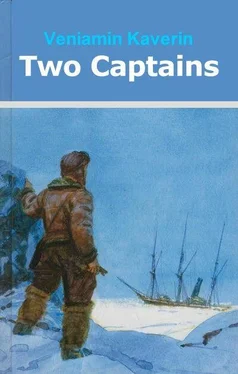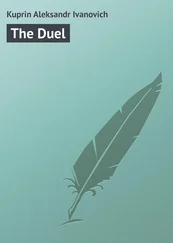Still unbent, unyielding to sorrow, she had only turned grey, and two deep creases hung over her down-drooping mouth.
"What am I to call you now?" she said, when we met in the little front garden. "You were a boy then. How many years is it? Fifteen7 Twenty?"
"Only nine, Anna Stepanovna. And call me Sanya. I'll always be Sanya to you."
"A naval airman, with decorations," she said, as though she shared with me the pride of my being a naval airman with decorations. "Where have you come from now? From what front?"
"Just now from Novaya Zemlya, but before that from Polarnoye. And straight from Ivan Ivanovich."
"No, really?"
"My word of honour."
After a pause she said: "So you have seen him?"
"Seen him? Why, we used to meet very often. Didn't he write you about it?"
"He did," Anna Stepanovna admitted, and I realised that she knew about Katya.
But I did not need to check her as she had checked me when I started to speak about Volodya. She did not use any words of comfort, did not compare her grief to mine. She merely embraced me and kissed me on the head, and I kissed her hand.
"Well, and how's my old man? Is he well?"
"Quite well."
"D'you mind if I tell my friends that you've arrived. How much time have you got?"
I said that I was free till night. She placed before me bread, fish and a tankard of homebrewed wine, which they were very good at making in Zapolarie, put on a shawl, excused herself and went out.
It was rather thoughtless of me, though, to let Mrs Pavlova tell her friends that I had arrived. Within less than half an hour a car drew up outside the house and I was surprised to see all my crew in it.
"Sanya," the navigator said, "Comrade Ledkov has sent for us. Jump in and let's be off. We'll have breakfast at his place and then-"
"Ledkov? Just a minute… Ah, yes, of course! Ledkov!"
This was the District Executive Committee member for whom the doctor and I had flown to Camp Vanokan, where Ledkov lay with a wounded leg. He was as well known among the Nentsi in the North as the famous Dya Vilka was among the inhabitants of Novaya Zemlya.
"Incidentally," the doctor had once told me, "he was interested to know whether you had found Captain Tatarinov. Remember, when we were expecting you with the expedition, well, he even rode out to some nomad camps to make inquiries of the Nentsi. According to his information a legend about the St. Maria should have been preserved in one of the clans."
It is not difficult to imagine how warmly we were welcomed to Zapolarie by Ledkov. My memory of him was vague, and I was surprised to find that the man who came out onto the porch to meet us was anything but old. After dinner we drove down to the sawmill, then visited the new health-centre, and so on. Everywhere we had something to eat and drink, and everywhere I spoke about Ivan Ivanovich. In the end I began to believe myself that without Ivan Ivanovich's contribution the defence of our northern sea routes might well have met with disaster.
Before take-off there were some things I had to attend to. I sent the navigator and gunners to the airfield, while I remained with Ledkov in his office at the D.E.C.
"Now tell me frankly," Ledkov said, "how's our old friend getting on out there? We need him here ever so badly. It could easily be arranged, you know." "What could?"
"To have him recalled and demobbed. He's above age." "No, he wouldn't stay," I said, remembering how sore Ivan Ivanovich had been when the flotilla commander had not allowed him to join a submarine crew on a dangerous mission. "He might agree to come on leave. But not to stay. Especially now."
The "now" was an intimation that the war would soon be over, but Ledkov interpreted it to mean "now that Volodya has been killed".
We were sitting in armchairs by a wide window, which presented a panorama of new streets running from the riverside to the taiga. Smoke rose from the sawmill, electric trolleys ran in and out among the timber stacks at the lumber yard, and a way out, untrodden, bluish-grey, stood forest upon virgin forest.
I asked him about his visit to the Nentsi camps where they were said to have preserved some legends about the men from the St. Maria. Was it true that he had gone there and questioned the Nentsi? "Yes, I went there. It was the camp of the Yaptungai clan." "Did you learn anything?" "I did."
I might have been seventeen again, the way my heart leapt. "What exactly?" I asked coolly.
" "I got the legend and wrote it down. I don't remember now where I put those notes," he said, running his eye over the revolving bookstand loaded with folders and rolled-up papers. "It runs roughly like this: In the old days, when 'father's father was alive', a man came to the Yaptungai family who called himself a sailor off a schooner that was wrecked in the ice of the Kara Sea. This sailor related that ten men were saved who wintered on an island north of the Taimyr. Then they made for the mainland, but on the way 'many, many die'. But he 'at one place not want to die' and he pushed on. And so he reached the Yaptungai camp." "Do they remember his name?"
"No. He died shortly. I took it down like this: 'He come, he say-I will live. He finish speaking and die.' "
A map of the Nenets region and part of the Kara Sea hung in Ledkov's office. I found the familiar route-to Russian Islands-Cape Sterlegov-the mouth of the Pyasina.
"Where do the Yaptungai have their grazing grounds?" Ledkov pointed them out. But even before he did so I had found the district's northern boundary and measured the distance with my eye.
"It was a sailor from the St. Maria."
"You think so?"
"Just figure it out. He said that ten men were saved."
"Yes, ten."
"Thirteen went off with Navigator Klimov. That leaves twelve in the schooner. Two of them-the engineer Tisse and the sailor Skachkov-died in the first year of drift. That leaves ten. But that's not the point. Even before, I could have shown you the route they took to within half a degree. The only thing I was not clear about was whether they had succeeded in reaching the Pyasina."
"And now?"
"Now I'm sure."
And I pointed to the spot where the rest of Captain Tatarinov's expedition would be found, if they were ever to be found anywhere on land.
"Anna Stepanovna, I'm so sorry, I shouldn't have stayed so long with Ledkov," I said, calling at her house that night and finding her waiting for me, the table laid. "But I must be going. I'll just give you a kiss and be off."
We embraced.
"When will you be coming back?"
"Who knows? Maybe tomorrow. Maybe never."
" 'Never' is a dreadful word, I know it," she said with a sigh and made the sign of the cross over me. "You should never say it. You'll come back and you'll be happy, and we old people will warm ourselves again at your happiness."
Late that night-that it was late night you could only discover by consulting your watch-we started out from Zapolarie. A reddish sun stood high in the sky. Fleecy clouds raced past, piling up, like steam from an enormous locomotive.
Could I ever have imagined that the day I had been waiting for all my life was now coming? I could not! The crew had checked the engines while I was away, but I was worried whether the check had been thoroughly carried out.
Chapter Six
VICTORY
We took off at two in the morning, and at half past four we sank the raider. True, we did not see it sink. But after our torpedo hit it it lost steerageway and was swallowed up in a cloud of steam.
Briefly, it happened something like this: the ship was cruising in such a nonchalant manner that the navigator and I started an argument (which had better not be quoted in this book) as to whether the ship did not belong to our Northern Fleet. Having settled that it did not, we drew away from it-my navigator's favourite way of doing the job-then banked steeply to port and made straight for the target.
Читать дальше












